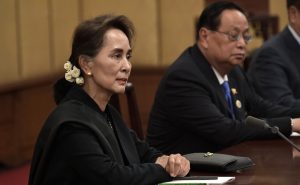On October 16, Myanmar’s Union Election Commission (UEC) announced the cancellation of the upcoming national elections in conflict-ridden regions of the country, including swathes of territory in Shan and Rakhine states.
According to the UEC, the cancellations will affect 56 of Myanmar’s 330 townships, in whole or in part, including 23 townships in Shan State and 11 townships in Rakhine. In announcing its decision, the commission stated that these regions were “not in a situation to hold free and fair elections” on November 8. Elections have also been called off in unstable parts of Kachin, Kayin, and Mon states, as well as in Bago Region.
In themselves, the cancellations are not unexpected. Significant areas of Myanmar’s periphery are active conflict zones where holding elections would be a perilous enterprise at best. Others are under the control of raft of ethnic armed groups and militias that have no intention of taking part in any case. For these reasons, residents of either part or all of 16 townships in Shan State were unable to vote at the last election in 2015.
Since then, however, the situation has worsened, particularly in Rakhine State, where fighting between the Myanmar military and the Arakan Army (AA) intensified in late 2018. Since then, the civil war in Rakhine has killed or injured hundreds and forced 150,000 from their homes. The AA insurgency began shortly after the army’s brutal assault on Muslim Rohingya communities of northern Rakhine, which caused thousands of civilian deaths and has driven more than 700,000 people over the border into Bangladesh.
Questions have also been raised about the selectivity of the recent cancellations. In Rakhine State, more than 1.1 million voters have been effectively disenfranchised by the UEC’s move. This comes on top of the disenfranchisement of a similar number of Muslim Rohingya voters, whom Myanmar government considers illegal immigrants, despite many of them having voted in previous elections.
As mentioned, many of the cancellations in Rakhine were probably necessary, a reality demonstrated by last week’s armed kidnapping of three members of the ruling National League for Democracy (NLD) by suspected AA insurgents. But some have questioned why the elections have been called off in seven constituencies held by the local Arakan National Party (ANP), but will still go ahead in three of the four Rakhine constituencies where the NLD prevailed in 2015.
According to Richard Horsey, Myanmar adviser to the International Crisis Group, the UEC also refrained from canceling the election in Paletwa township, just over the border from Rakhine in Chin State, where AA-Myanmar army fighting has made it one of the most conflict-affected townships in the country. Similarly, all five elected positions in Paletwa are held by the NLD.
These discrepancies have naturally prompted controversy and claims that the UEC is effectively doing the bidding of the NLD and its leader Aung San Suu Kyi. Under Article 398 of Myanmar’s Constitution, the President is responsible for appointing the members of election body, with no requirement that the appointees be independent. The constitution also offers no avenue for the review or appeal of UEC rulings.
Whatever the merits of the UEC’s decision, Horsey said on Twitter, “the problem is cancellation decisions are taken by commission in [a] totally opaque manner, no engagement or public explanations given. This erodes trust and leaves the way open to claims of bias and gerrymandering by authorities.”
Indeed, the UEC’s decision is very likely to deepen the center-periphery tensions that have fueled Myanmar’s perpetual cycles of conflict since independence. On October 18, in response to the UEC’s announcement of the cancellations, five ethnic-based parties released a joint statement, condemning the revocations and going as far as stating that the measures “will push people to resort to extra-parliamentary action” – a formulation that could easily be interpreted as armed struggle.
As Khin Zaw Win, the director of the Tampadipa Institute, a local advocacy group, argued in an article on October 18, “Government catchwords of ‘ethnic unity’ and ‘equality’ have never sounded more hollow.”
What does this all mean? During the long years of military dictatorship, it was tempting to believe that the end of junta rule and the advent of free democratic elections would put Myanmar on the path toward a sustainable peace. But the coming of relatively free elections has been far from a panacea. With every passing year, it has become more evident that Myanmar’s electoral politics sits downstream of unresolved racial divides and hoary national myths that predate the nation’s independence from Britain in 1948.
In outlying regions of the country, there is now a danger of democratic processes getting so tangled up in political resentments and questions of ethnic identity that they drain public support for democracy as a whole.

































